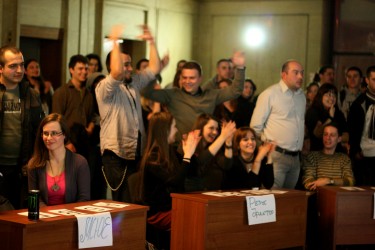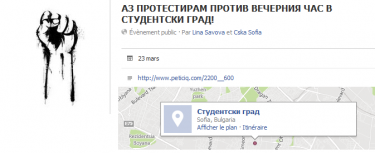On February 29, 2012, a 19-year-old student died during a violent brawl with three other students. The tragic accident happened in Sofia, in the district Studentski Grad (Students’ City), where Bulgarian public universities provide accessible accommodation to their students. It is unclear who exactly is responsible for the death of the student, but the whole situation sparkled a debate in the mainstream as well as the citizen media.
In response, the government decided [bg] to impose a curfew over the district: housing buildings will be accessible up to 11pm and nobody will be authorized to enter between 11pm and 6am. Furthermore, from April 5 onwards, guests will be prohibited from entering without identification. Lastly, the government promised to install CCTV observation at each level of the buildings in the district.
This measure has some lingering odour reminiscent of the practices employed under the communist regime, and it has shocked more than one person. Twitter user @GreenLSK wrote [bg]:
@GreenLSK: Колко се радвам, че не живея в Студентски град… Как ще им слагат вечерен час, бе?
The curfew was immediately denounced as inefficient and insulting. Thus, blogger Anguel Igov offers a thought-provoking view [bg] on why “the curfew won't work”:
Мярка лесна за въвеждане, трудна за налагане и в крайна сметка напълно безсмислена. Вечерни часове има в подобни общежития по света и практиката показва, че потърпевшите от тях са много изобретателни в заобикалянето им. Но вечерният час е безсмислен не защото няма да се спазва, а защото дори да се спазва, няма да реши проблема с атмосферата на Студентски град – която предразполага към всичко друго, само не и към учене, и очевидно създава ред опасности за здравето и живота на обитаващите го.
Като съм казал “проблема”, дайте да видим къде е всъщност той. Предлагам ви два отговора: а) проблемът е в студентите; б) проблемът е в кръчмите и чалготеките, превзели квартала. Мярката “вечерен час” почива на логиката, че верен е отговор а): дайте да затворим студентите по стаите след определен час и всичко ще бъде наред.
This measure is easy to introduce, difficult to enforce, and is ultimately completely pointless. Evening hours are frequent in similar residences in other countries and experience shows that their victims are very creative in circumventing them. But the curfew is not meaningless because it would not be respected, but because – even if observed – it will not solve the problem of the atmosphere in Studentski Grad – which predisposes to anything but studying and creates obvious health and life hazards for those dwelling there.
As I said “problem”, let's see where it actually lies. I suggest two answers to you: a) the problem is the students; b) the problem is in the pubs and [chalga] clubs plaguing the neighborhood. The measure “curfew” is based on the logic that the faithful response is a): let's close our students safe after a certain time and everything will be okay.
As he points out, the real issue is the conditions of life in Studentski Grad, denounced as insanitary and utterly insufficient for optimal study. Indeed, three students usually share a 25-30 sq. m room, the whole district has only one library, no bookshop, and innumerable pubs and chalga clubs. The often quite nasty media opinions [bg] depicting students as lazy, uninterested, eternally-drunk young people with dubious moral values have never really stopped popping up. Strikingly, this happens after such rare tragic accidents when the mainstream media and various experts explain ad nauseam how violent the students are and how they threaten Bulgaria's future development.

A student quizz at the Faculty of History, University of Sofia: another entertainment is possible! Photo by Zornitza Radulova (CC-by-SA 3.0)
The curfew is thus presented to the population as the only way of calming down a bunch of people whose lowest animal instincts transform them into public danger. In turn, the government acts as a tamer, compensating for the alleged failure of the university.
Some argued [bg] that this measure is just an imitation of action:
Вечерният час няма да реши нищо по никакъв начин. Това е поредният блъф на държавата за пред обществото, с надеждата, че като отчетат някаква дейност, всичко пак ще се забрави. Най-вероятно то така и ще стане… засега.
Others, such as Global Voices Bulgarian contributor Ivaylo Dinev, reacted to this misrepresentation with numerous arguments describing [bg] where the real problem is: not the people, but the environment they evolve in and the irresponsibility it creates:
Не считам, че пресилено ще прозвучи, ако реша да определя българското студентсване като една самозаблуждаваща се свобода на безотговорността. Една свобода без отговорности. […]
Студентите обаче, и бих се самоцитирал, не сме виновни, защото ние сме продукт.
Социалната роля „Студент” е продукт на цялото общество, което задава изискванията към своите най-жизнени части. Нужно е да разберем, и това е пределно ясно, че студентите не се самопроизвеждат.
Занижените критерии към студентите не стимулират дейното им участие в образователния процес. Оценките се изкарват лесно, а изпитите са веднъж на семестър. Защо тогава да не се напиват и пребиват ежедневно? Защо да не мързелуват? Всъщност мързел ли е, когато никой не изисква да свършиш някаква, дори минимална работа през годината?
I do not think that it will sound far-fetched if I decide to define Bulgarian studentship as an auto-deluding freedom of irresponsibility. A freedom without responsibility. […]
Students, however, and I'd include myself here, are not guilty because we are a product.
The social role of a “student” is a product of the society, which specifies the requirements for its most vital parts. We need to understand it and it is clear that students don't stem up out of nowhere.
University's lowered criteria do not encourage students to actively participate in the educational process. Grades are easily obtained and exams are once per semester. Why not drink and beat people up every day? Why not be lazy? Actually, is it laziness when nobody requires from you to finish some, even minimal, work during the year?
The student mobilization against this measure was so strong that BNR (the Bulgarian National Radio) conducted an interview [bg] with three students and aired it, provoking a reaction from the Ministry of Education, which stated [bg] it would control all pubs in the district and would close the illegal ones.
In their interview, the students pointed out [bg] the real problem that had been carefully avoided by the officials so far:
Не трябва да се лъжем, че има някакви лоши хора в Студентски град, мутри, примерно, които са дошли ей така. Те са дошли, защото им е позволено, и то от ректорите на университетите.
Indeed, the deans are the official representatives of public universities and are responsible for the housing facilities and what their uninhabited parts are used for by private entrepreneurs. Thus, students are accused of going to pubs instead of studying, but university deans are the ones signing the renting agreements with pub owners.
Whether to impose a full curfew or not will be decided on April 5, by the Deans Council. A Facebook event [bg] has been created, calling for a protest in case the curfew is imposed. The motivation [bg] behind it seems straightforward:
Поощряването на простотията в една самозаблуждаваща се свобода без отговорности направи Студентски град „Град на греха”. И докато данъкоплатците осигуряват пиршества и забавления, смятайки че зад тях се крият денонощия четения на тежки томове, обществото ще се самозаблуждава, че висшето образование е качествено.
Някой трябва да прекъсне затворения кръг. И неминуемо това ще се случи.
Promoting stupidity in an auto-deluded freedom without responsibility has transformed Studentski Grad into “Sin City.” And while taxpayers provide feasts and entertainment, thinking that days of heavy-volume study hides behind, the public will maintain the error that higher education is of high quality.
Someone has to break the cycle. And inevitably it will happen.







